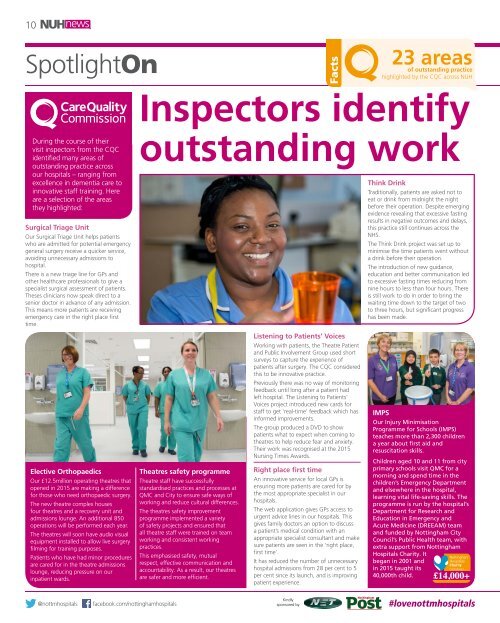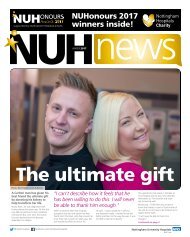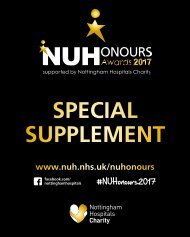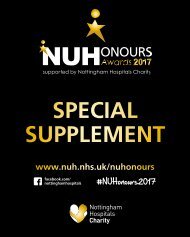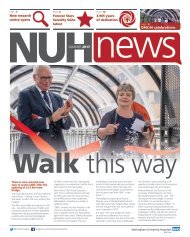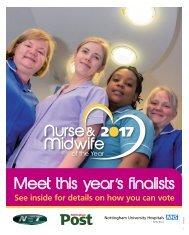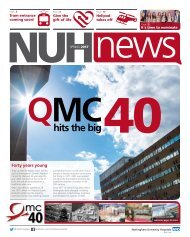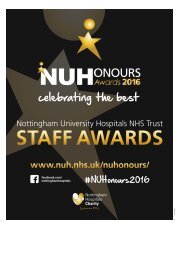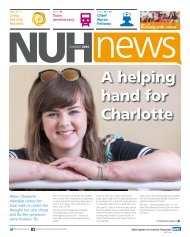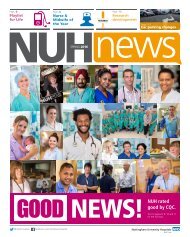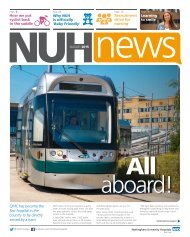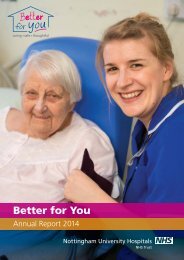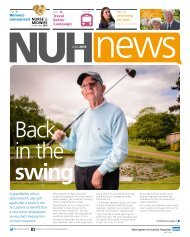NUH News SPRING 2016 Online
Create successful ePaper yourself
Turn your PDF publications into a flip-book with our unique Google optimized e-Paper software.
10<br />
SpotlightOn<br />
Facts<br />
23 areas<br />
of outstanding practice<br />
highlighted by the CQC across <strong>NUH</strong><br />
During the course of their<br />
visit inspectors from the CQC<br />
identified many areas of<br />
outstanding practice across<br />
our hospitals – ranging from<br />
excellence in dementia care to<br />
innovative staff training. Here<br />
are a selection of the areas<br />
they highlighted:<br />
Surgical Triage Unit<br />
Our Surgical Triage Unit helps patients<br />
who are admitted for potential emergency<br />
general surgery receive a quicker service,<br />
avoiding unnecessary admissions to<br />
hospital.<br />
There is a new triage line for GPs and<br />
other healthcare professionals to give a<br />
specialist surgical assessment of patients.<br />
Theses clinicians now speak direct to a<br />
senior doctor in advance of any admission.<br />
This means more patients are receiving<br />
emergency care in the right place first<br />
time.<br />
Elective Orthopaedics<br />
Our £12.5million operating theatres that<br />
opened in 2015 are making a difference<br />
for those who need orthopaedic surgery.<br />
The new theatre complex houses<br />
four theatres and a recovery unit and<br />
admissions lounge. An additional 850<br />
operations will be performed each year.<br />
The theatres will soon have audio visual<br />
equipment installed to allow live surgery<br />
filming for training purposes.<br />
Patients who have had minor procedures<br />
are cared for in the theatre admissions<br />
lounge, reducing pressure on our<br />
inpatient wards.<br />
Inspectors identify<br />
outstanding work<br />
Theatres safety programme<br />
Theatre staff have successfully<br />
standardised practices and processes at<br />
QMC and City to ensure safe ways of<br />
working and reduce cultural differences.<br />
The theatres safety improvement<br />
programme implemented a variety<br />
of safety projects and ensured that<br />
all theatre staff were trained on team<br />
working and consistent working<br />
practices.<br />
This emphasised safety, mutual<br />
respect, effective communication and<br />
accountability. As a result, our theatres<br />
are safer and more efficient.<br />
Listening to Patients’ Voices<br />
Working with patients, the Theatre Patient<br />
and Public Involvement Group used short<br />
surveys to capture the experience of<br />
patients after surgery. The CQC considered<br />
this to be innovative practice.<br />
Previously there was no way of monitoring<br />
feedback until long after a patient had<br />
left hospital. The Listening to Patients’<br />
Voices project introduced new cards for<br />
staff to get ‘real-time’ feedback which has<br />
informed improvements.<br />
The group produced a DVD to show<br />
patients what to expect when coming to<br />
theatres to help reduce fear and anxiety.<br />
Their work was recognised at the 2015<br />
Nursing Times Awards.<br />
Right place first time<br />
An innovative service for local GPs is<br />
ensuring more patients are cared for by<br />
the most appropriate specialist in our<br />
hospitals.<br />
The web application gives GPs access to<br />
urgent advice lines in our hospitals. This<br />
gives family doctors an option to discuss<br />
a patient’s medical condition with an<br />
appropriate specialist consultant and make<br />
sure patients are seen in the ‘right place,<br />
first time’.<br />
It has reduced the number of unnecessary<br />
hospital admissions from 28 per cent to 5<br />
per cent since its launch, and is improving<br />
patient experience.<br />
Think Drink<br />
Traditionally, patients are asked not to<br />
eat or drink from midnight the night<br />
before their operation. Despite emerging<br />
evidence revealing that excessive fasting<br />
results in negative outcomes and delays,<br />
this practice still continues across the<br />
NHS.<br />
The Think Drink project was set up to<br />
minimise the time patients went without<br />
a drink before their operation.<br />
The introduction of new guidance,<br />
education and better communication led<br />
to excessive fasting times reducing from<br />
nine hours to less than four hours. There<br />
is still work to do in order to bring the<br />
waiting time down to the target of two<br />
to three hours, but significant progress<br />
has been made.<br />
IMPS<br />
Our Injury Minimisation<br />
Programme for Schools (IMPS)<br />
teaches more than 2,300 children<br />
a year about first aid and<br />
resuscitation skills.<br />
Children aged 10 and 11 from city<br />
primary schools visit QMC for a<br />
morning and spend time in the<br />
children’s Emergency Department<br />
and elsewhere in the hospital,<br />
learning vital life-saving skills. The<br />
programme is run by the hospital’s<br />
Department for Research and<br />
Education in Emergency and<br />
Acute Medicine (DREEAM) team<br />
and funded by Nottingham City<br />
Council’s Public Health team, with<br />
extra support from Nottingham<br />
Hospitals Charity. It<br />
began in 2001 and<br />
in 2015 taught its<br />
40,000th child.<br />
Contributed...<br />
£14,000+<br />
@nottmhospitals<br />
facebook.com/nottinghamhospitals<br />
Kindly<br />
sponsored by<br />
#lovenottmhospitals


